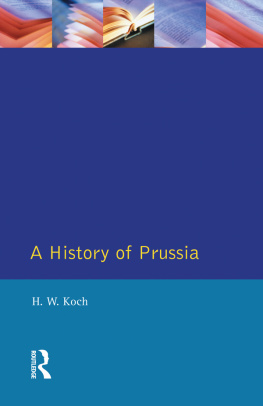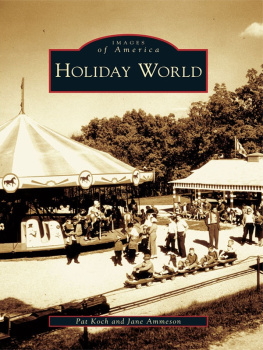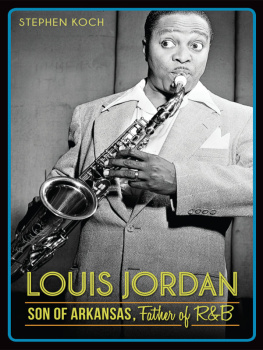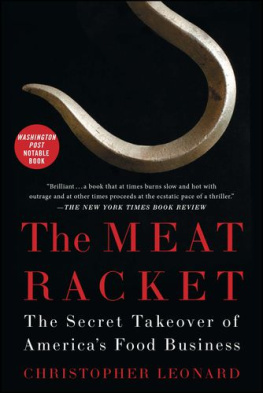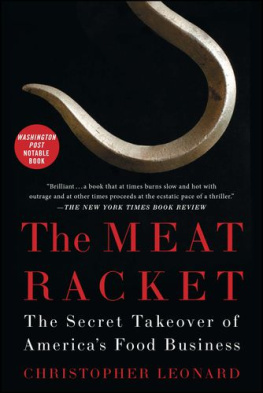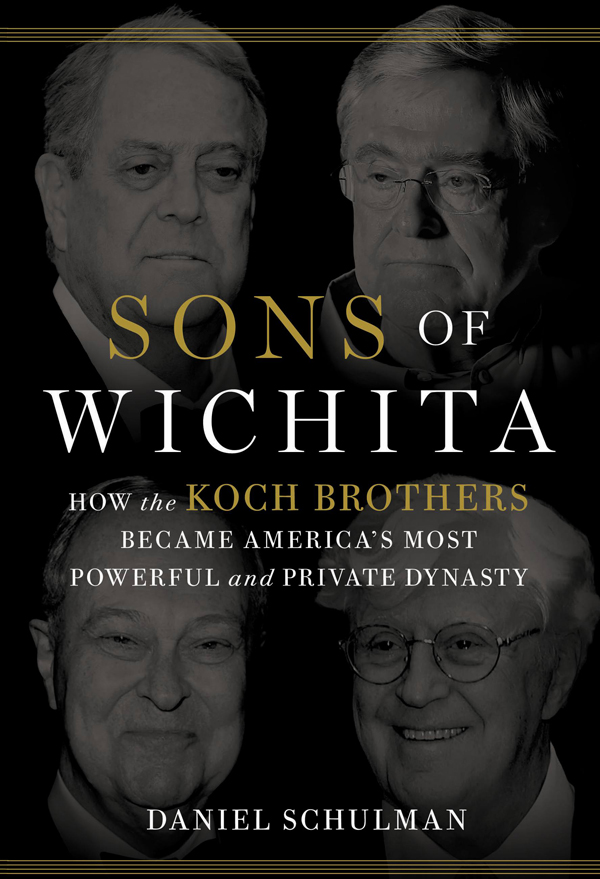Cover copyright 2014 by Hachette Book Group, Inc.
Jacket photograph of Charles Koch by Larry W. Smith/Polaris
Jacket photograph of Bill Koch by Gregory P. Mango/Splash News/Newscom
All rights reserved. In accordance with the U.S. Copyright Act of 1976, the scanning, uploading, and electronic sharing of any part of this book without the permission of the publisher constitute unlawful piracy and theft of the authors intellectual property. If you would like to use material from the book (other than for review purposes), prior written permission must be obtained by contacting the publisher at permissions@hbgusa.com. Thank you for your support of the authors rights.
Grand Central Publishing is a division of Hachette Book Group, Inc.
The Grand Central Publishing name and logo is a trademark of Hachette Book Group, Inc.
The Hachette Speakers Bureau provides a wide range of authors for speaking events. To find out more, go to www.hachettespeakersbureau.com or call (866) 376-6591.
The publisher is not responsible for websites (or their content) that are not owned by the publisher.
Morris eased the pickup truck to the side of the road. The wide, busy thoroughfares of 1950s Wichita, Kansas, were just five miles southwest, but here on the largely undeveloped outskirts of the city, near the Koch familys 160-acre property, the landscape consisted of little more than an expanse of flat, sun-bleached fields, etched here and there by dusty rural byways. The retired Marine, rangy and middle-aged, climbed out of the truck holding two sets of scuffed leather boxing gloves.
Okay, boys, he barked, get outside and duke it out.
David and Bill, the teenaged Koch twins, were at each others throats once again. Impossible to tell who or what had started it. But it seldom took much. The roots of the strife typically traced to some kind of competitiona game of hoops, a round of water polo in the family pool, a footrace. They were pathologically competitive, and David, a gifted athlete, often won. Everything seemed to come easier for him. Bill was just nineteen minutes younger than his fraternal twin, but this solidified his role as the baby of the family. With a hair-trigger temper, he threw the tantrums to match.
David was more even-keeled than Bill, but he knew how to push his brothers buttons. Once they got into it, neither backed down. Arguments between the twins, who shared a small room, their beds within pinching range of each other, transcended routine sibling rivalry.
Morris always kept their boxing gloves close at hand to keep the brothers from seriously injuring each other when their tiffs escalated into full-scale brawls, as they often did. The brothers industrialist father had officially hired the ex-soldier to look after the grounds and livestock on the familys compound. But his responsibilities also included chauffeuring the twins and their friends to movies and school events, and refereeing the fights that broke out unpredictably on these outings.
Holding their boxing gloves, Morris summoned the feuding twins from the truck. They knew the drill. He laced up one brother, then the other. The boys, both lean and tall, squared off, and when Morris stepped clear, they traded a barrage of punches.
A few minutes later, once theyd worked it out of their systems, Morris reclaimed the gloves and the brothers piled breathlessly into the cab of the truck. He slipped back behind the wheel, started the engine, and pulled onto the road.
Another day, another battle.
Pugilism was an enduring theme in the lives of the Koch family. The patriarch, Fred Kocha college boxer known for his fierce determination in the ringspent the better part of his professional life warring against the dark forces of communism and the collective might of the nations major oil companies, which tried to run him out of the refining business. As adults, Freds four sons paired off in a brutal legal campaign against one another over the business empire he bequeathed to them, a battle with plotlines that would seem far-fetched in a daytime soap opera. It would make Dallas and Dynasty look like a playpen, Bill once said.
The roles the brothers would play in the saga were established from boyhood. Fred and Mary Kochs oldest son, Frederick, a lover of theater and literature, left Wichita for boarding school in the Northeast and barely looked back. He was uninterested in the family business and a disappointment to his tough, bootstrapping father. An intensely private man who assiduously avoided the public eye, Frederick became a prolific arts patron and collector, with a passion for restoring historic properties stretching from Frances Cte dAzur to New Yorks Upper East Side.
Their father saw glimpses of himself in his rebellious second son, Charles, whom Fred Koch molded from an early age into his successor. After eight years in Boston studying chemical and nuclear engineering at MIT and working for a consulting firm, Charles returned to Wichita to learn the intricacies of his familys oil refining, engineering, and ranching businesses.
David and Bill followed Charles (and their father before him) to MIT and eventually they, too, joined the family business. But thats where their paths diverged. David became Charless loyal wingman, while Bill, still nursing childhood resentments, grew at first into a gadfly and then, in his brothers eyes, a hostile presence within the company. The public would know Bill best for his flamboyant escapades: as a collector of fine wines who embarked on a litigious crusade against counterfeit vino, as a playboy with a history of messy romantic entanglements, and as a yachtsman who won the Americas Cup in 1992an experience he likened, unforgettably, to the sensation of 10,000 orgasms.
Charles and David, meanwhile, built their fathers Midwestern empirewith about $250 million in yearly sales and 650 employees in the late 1960sinto a corporate behemoth Fred Koch would scarcely recognize, a company with $115 billion in annual revenues, more than 100,000 employees, and a presence in 60 countries. Under Charless leadership, Koch Industries grew into the second largest private corporation in the United States (only the Minneapolis-based agribusiness giant Cargill is bigger). Koch made its money the old-fashioned wayoil, chemicals, cattle, timberand in its dizzying rise, Charles and David amassed fortunes estimated at $40 billion apiece, tying them for sixth place among the wealthiest men on the planet. (Bill ranks 329th on


